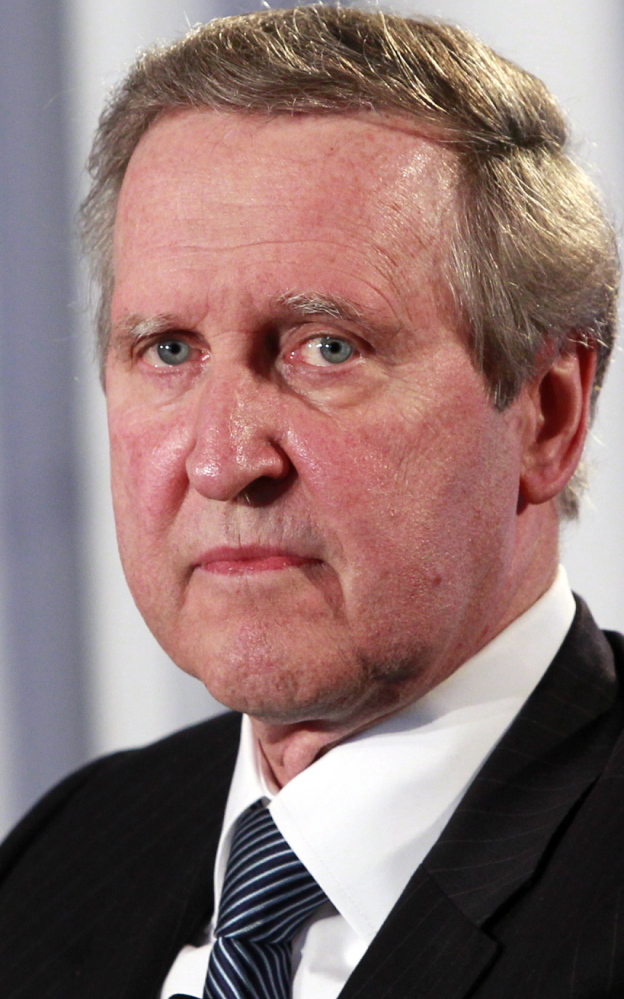As the United States and its allies step up military strikes against the Islamic State, two Mainers with decades in high-ranking defense and diplomatic positions said negotiating a deal with Russia over Syria is key to dismantling the terror organization.
Former Defense Secretary William Cohen said the Obama administration must increase air strikes against Islamic State targets while coordinating with allies, especially those Gulf state or Arab nations fighting on the ground. Cohen, a Republican who also represented Maine for more than 20 years in Congress, said “we need to intensify what we are doing and do it more effectively,” while increasing the amount of intelligence gathered and shared among allies.
“I think we need more (American) special forces on the ground, and I think we need to make the air campaign more effective and more extensive,” Cohen said in an interview Monday. “I’m not advocating that we put thousands of U.S. troops on the ground. We want to make this an international effort . . . What I do not want to see is U.S. forces conducting the major (ground) operations.”
But Cohen said he knows there is no military solution to Islamic State, also known as ISIS or ISIL, “unless we are prepared to stay there forever.” So the United States and Russia will have to find a way to allow Syrian President Bashar al-Assad to exit the stage. After the Paris attacks and the alleged downing of a Russian passenger plane by Islamic State militants, Russian President Vladimir Putin may be more willing to shift his military focus onto the Islamic State rather than other forces trying to topple Assad, a strong Russian ally.
‘A POLITICAL RESOLUTION’
“The question is how do we work with the Russians on a limited basis?” Cohen said. “They are not going to be our next best friend . . . but there is a commonality of interests.”
Former Ambassador Laurence Pope, a retired State Department official who worked extensively throughout the Middle East and northern Africa, agreed that there is a military component to defeating the Islamic State and added he understands the French need to strike the organization hard. But Pope, who served as director of the State Department’s Northern Persian Gulf program from 1987 to 1990, compared such military strikes to “putting a Band-Aid on a sucking chest wound” over the long term.
The U.S. government spent years and large sums of money trying to train moderate Syrian rebels fighting Assad but has little to show for it, Pope said. Instead, he said, it will take intensive political work to fill the governmental vacuums in Syria, parts of Iraq and other areas that allowed the Islamic State to emerge.
“It starts with a political resolution in Syria about removing Assad, and that is what I think we are going to be talking to Russia about in the coming years,” said Pope, a former ambassador to Chad who also worked in the U.S. embassies in Libya, Tunis, Bahrain and Morocco.
President Obama and Putin huddled together Monday to talk about the Islamic State and the Syrian crisis during an international summit in Turkey. During a news conference, however, Obama was also on the defensive about his administration’s handling of the Islamic State and of the years-long civil war in Syria.
CRITICISM FROM REPUBLICANS
Some of the loudest criticisms have come from Republicans in Congress.
U.S. Sen. Susan Collins, R-Maine, said Monday that the Islamic State “has metastasized to the point where it has more sanctuaries in more countries throughout the Middle East, North Africa, and Asia than at any time in recent memory.”
“It is clear that the administration does not have a winning strategy to achieve the goal of defeating ISIS,” Collins, a members of the Senate Intelligence Committee, said in a statement. “In order to confront this burgeoning threat, we need to significantly increase intelligence sharing with our allies. In addition, air power and 50 members of our special forces will not be sufficient. Our allies in the region, including Arab countries and Turkey as a NATO ally, should contribute the ground forces to supplement the airstrikes carried out by the U.S. and our allies.”
Some of the most successful operations against the Islamic State have involved U.S. airstrikes supporting Kurdish ground troops, Collins said.
U.S. Sen. Angus King, a Maine independent who also serves on the 15-member Senate Intelligence Committee, has focused his frustration more on the Mideast nations who he argues are not doing enough to counter the Islamic State.
“Ultimately, this fight against ISIL will not be won by the West alone,” King said in a statement. “That’s why the U.S., in conjunction with its coalition partners, should apply greater pressure to ensure that leaders in the Middle East meet their obligation to forcefully reject the ideology of ISIL and contribute resources that will ultimately lead to its defeat. Additionally, the U.S. can and should undertake an aggressive air campaign targeting ISIL’s key leaders, military capabilities, and revenue sources. We must also undercut ISIL’s appeal by countering their propaganda machine and by working with other nations to advance the departure of Assad, whose brutality has driven droves of people to ISIL’s ranks.”
Send questions/comments to the editors.



